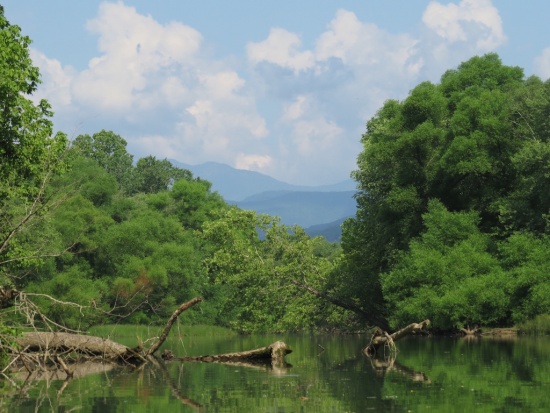Sbarnhardt (talk | contribs) (Attempting again to upload location picture) |
Sbarnhardt (talk | contribs) (Added References section) |
||
| Line 43: | Line 43: | ||
===Contact Details=== | ===Contact Details=== | ||
''To do'' | ''To do'' | ||
| + | ==References== | ||
| + | # | ||
==External Links== | ==External Links== | ||
''To do'' | ''To do'' | ||
Revision as of 16:31, 25 July 2020
| This article is incomplete. This article is missing one or more sections. You can help the BirdForum Opus by expanding it. |

Photo © by hamhed
McDowell County in Western North Carolina July, 2020
Overview
Western North Carolina (WNC) is an area of diverse examples of nature, geography, and habitat.
It begins in an area of gentler, rolling hills around Wilkes, Burke, and Rutherford counties and extends westward to the Tennessee-North Carolina border areas in the midst of the peaks, and vistas, of the Great Smoky Mountains and Appalachian Mountain Ranges.
It is an area of middle-size cities and towns in the eastern portion and of increasingly smaller communities and towns in the more rugged western portion.
It’s a region of gently meandering streams and rivers on the one hand while having within it’s bounds, world-class white-water in the Nantahala area.
It’s gentle, idyllic trout streams in an area where Black Bear and Elk roam.
It’s birds as small as a sparrow and as majestic as a Bald Eagle.
It’s flora and fauna from one end of the spectrum of nature to the other.
It “is” as author Christian Reid said, in the title of the 1876 book, “The Land of the Sky.” A nickname that is frequently used to refer to the far western portion of Western North Carolina to this day.
Birds
Notable Species
The term “notable, when it comes to describing species of birds, as it applies to Western North Carolina, is a term as widely interpreted as the landscape and people of the region. It is definitely worth noting the venerable Bald Eagle has been reported to some amount in all counties in this part of the state.
Other oft reported species of birds in the area are the Broad-winged Hawk, Common Grackle, Pine Siskin, Swainson's Thrush, American Robin, Red-winged Blackbird, European Starling, Song Sparrow, Canada Goose, Tree Swallow, Turkey Vulture, and Northern Rough-winged Swallow among others.
Rarities
Species seen, but not often, can include Summer Tanager, Nashville Warbler, Dickcissel, Wilson's Warbler, Cerulean Warbler, Kirtland's Warbler, Western Tanager, Black-capped Chickadee, Bay-breasted Warbler, Prairie Warbler, Connecticut Warbler, Yellow-throated Warbler, and Blue Grosbeak.
Check-list
Birds you can see here include:
In addition to those species you saw in the oft-reported list under “Notable Species”, you might want to add these to the list as species you might see. The Chimney Swift, Downy Woodpecker, Common Nighthawk, Common Raven, Vesper Sparrow, Eastern Kingbird, Pileated Woodpecker, Little Blue Heron, Spotted Sandpiper, Worm-eating Warbler, Marbled Godwit, White-eyed Vireo, Double-crested Cormorant, Cliff Swallow, Wood Duck, Brown Thrasher, Winter Wren, Wood Thrush, and Northern Parula.
Other Wildlife
To do
Site Information
History and Use
To do
Areas of Interest
To do
Access and Facilities
To do
Contact Details
To do
References
External Links
To do
Maps
“To Do”




